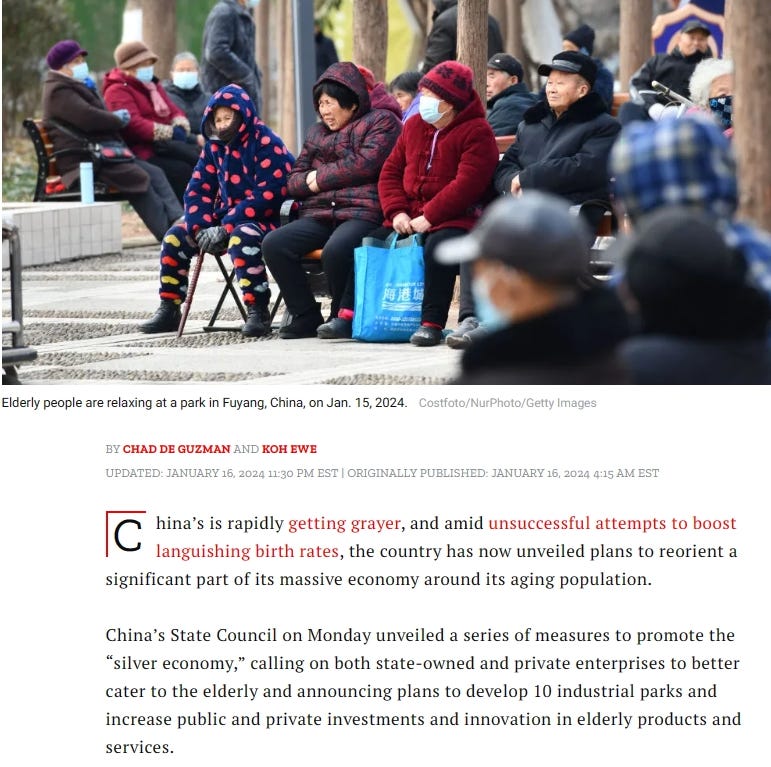After dropping 850,000 in 2022, China's Population Officially Dropped by 2 Additional Million in 2023. Birth Rates Declined from 6.77 in 2022 to 6.39 in 2023.
Accelerating depopulation, possibly irrecoverable, will certainly affect China's economy, social and strategic planning in coming years, as well as her relations and interactions with other nations.
China has released official vital statics, accounting for births and deaths in the Middle Kingdom in 2023. Deaths have risen and births have dropped compared to prior years. China’s 2023 population of 1.4097 billion is exceeded by India’s population which is estimated at 1.428 billion.
Though faring better than Hong Kong SAR (2022 Crude Birth Rate of 4.4), China has reported an official crude birth rate of 6.39 in 2023, lower than their crude death rate of just under 8. Fertility rate stands at 1.7 births per woman, well below the replacement level of 2.1, and matching the Philippines 2022 Urban Fertility Rate of 1.7 (Philippines rural rate is 2.2, overall rate is 1.9).
Births remained under 10 million for the second year running with only 9.02 million births down from 9.56 million in 2022, a decline of 5.6%. There were 11.1 million reported deaths, an increase of 6.7% against the 10.4 million deaths reported in 2022.
While birth rates have dropped, they are exceeded by annual induced abortion rates, which are estimated to be at least 10 million a year.
The median age in China is estimated at 39, putting nearly half of the population approaching or above reproductive age. Without major incentives (and support) for families to have children, the birth rates will likely continue to decline. Contrast this with India’s median population age which is 28.2, still well within their prime reproductive years and with a fertility rate 2.14, just above replacement). Contrast this with the Philippines which has a median age of around 25, yet a fertility rate already below replacement at 1.9.
Elimination of the one-child policy in 2016 did not reversed China’s declining natural population growth rate (births-deaths). Simply asking a population to have more children will not work if parents do not feel they can afford to have children or feel supported by society in raising those children.
The article goes on to discuss China’s changing focus towards serving and maximizing the silver economy, with 21.1% of the population already aged 60 and over.
In terms of gender, China has about 720.32 million males against 689.35 females, nearly 31 million more men than women. This imbalance will compound social issues as men who do want partners must compete for too few female partners.
China is joining the population collapse of many European and developed nations. Challenges (and opportunities) await as the world enters and adjusts to this new phase.






In a satellite Philippines immigration office earlier this week there seemed to be no shortage of Chinese citizens 😂
I have a much different view of population since reading Radu Cinamar's book, Forgotten Genesis, and listening to Apollymi Mandylion explain how she was ordered to extirminate most human, plant and animal life on Earth several times. This wasn't because the people were performing abominations so much as because experiments have time limits. According to both Apollymi and the Maya calendar, Earth's last cycle of 25,000 years is divided into five "great" cycles of approximately 5,000 years. The very last cycle before the whole solar system ascended to a higher vibrational frequency was supposed to end in 2012 (the year of the dragon), but for some reason was postponed to 2024 (the year of the dragon).
Now I understand that an entire civilization can be created from just one male and one female. Furthermore, because the akashic record (the alayavijnana) is forever, nothing created is ever lost -- ever.
I posted this yesterday:
"Six facts about China you may be unaware of"
https://open.substack.com/pub/dianabarahona/p/six-facts-about-china-you-may-be
Also, China Daily is publishing articles about China's efforts to balance its population and its economy. Remember, China was a great nation when it had 100 million people, and robots can produce many things, so a population reduction is a problem of balance. (And we are not even addressing China's colonies in outer space, another topic!)
http://www.chinadaily.com.cn/a/202401/18/WS65a862a7a3105f21a507ce44.html